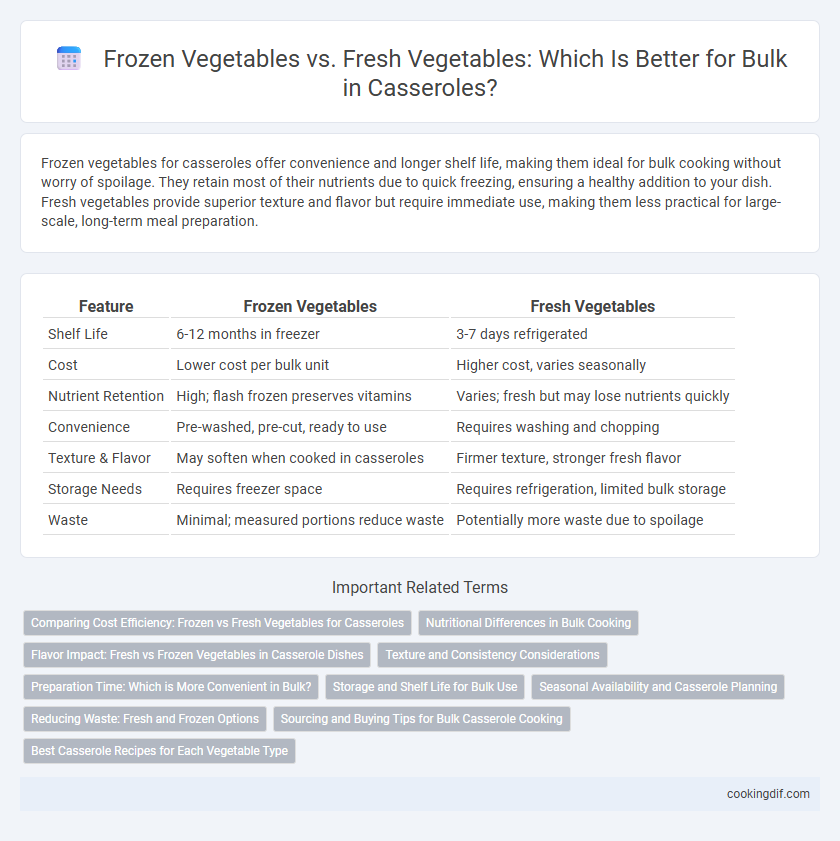Frozen vegetables for casseroles offer convenience and longer shelf life, making them ideal for bulk cooking without worry of spoilage. They retain most of their nutrients due to quick freezing, ensuring a healthy addition to your dish. Fresh vegetables provide superior texture and flavor but require immediate use, making them less practical for large-scale, long-term meal preparation.
Table of Comparison
| Feature | Frozen Vegetables | Fresh Vegetables |
|---|---|---|
| Shelf Life | 6-12 months in freezer | 3-7 days refrigerated |
| Cost | Lower cost per bulk unit | Higher cost, varies seasonally |
| Nutrient Retention | High; flash frozen preserves vitamins | Varies; fresh but may lose nutrients quickly |
| Convenience | Pre-washed, pre-cut, ready to use | Requires washing and chopping |
| Texture & Flavor | May soften when cooked in casseroles | Firmer texture, stronger fresh flavor |
| Storage Needs | Requires freezer space | Requires refrigeration, limited bulk storage |
| Waste | Minimal; measured portions reduce waste | Potentially more waste due to spoilage |
Comparing Cost Efficiency: Frozen vs Fresh Vegetables for Casseroles
Frozen vegetables offer superior cost efficiency for casseroles, often priced 20-50% lower than fresh counterparts, especially when purchased in bulk. Their extended shelf life minimizes waste, reducing overall food expenses compared to fresh vegetables that spoil quickly. Nutrient retention in frozen options remains high due to flash freezing, ensuring both budget-friendly and health-conscious casserole preparations.
Nutritional Differences in Bulk Cooking
Frozen vegetables retain most vitamins and minerals due to quick freezing after harvest, preserving nutrients like vitamin C and potassium essential for casseroles. Fresh vegetables may lose nutrients during storage and transport, especially in bulk cooking where prolonged prep times cause degradation. Using frozen vegetables in bulk casseroles ensures consistent nutritional content and reduces waste without compromising flavor or texture.
Flavor Impact: Fresh vs Frozen Vegetables in Casserole Dishes
Fresh vegetables offer a vibrant flavor and crisp texture that enhance the overall taste and presentation of casserole dishes, delivering a more authentic and rich vegetable essence. Frozen vegetables, while convenient and often pre-cut for bulk cooking, can experience mild flavor loss and a softer texture due to blanching and freezing processes, which may slightly dilute the casserole's depth of flavor. Selecting fresh vegetables maximizes the flavor impact by preserving natural sugars and aromatic compounds critical to a well-balanced and flavorful casserole.
Texture and Consistency Considerations
Frozen vegetables in casseroles maintain a consistent texture due to rapid blanching and freezing, which preserves cell structure better than fresh bulk vegetables that may vary in ripeness and moisture content. Fresh vegetables tend to release more water during cooking, potentially leading to a softer, less firm casserole texture. Choosing frozen vegetables ensures uniform firmness and reduces the risk of inconsistent cooking results in large-scale casserole preparations.
Preparation Time: Which is More Convenient in Bulk?
Frozen vegetables significantly reduce preparation time for bulk casserole dishes since they are pre-washed, chopped, and ready to use, eliminating the need for peeling and cutting. Fresh vegetables require extensive washing, peeling, and chopping, increasing labor and overall prep time, which can be impractical for large quantities. Choosing frozen vegetables enhances efficiency and convenience, making them ideal for bulk cooking scenarios.
Storage and Shelf Life for Bulk Use
Frozen vegetables offer superior storage convenience and extended shelf life compared to fresh vegetables, making them ideal for bulk casserole preparation. Properly stored frozen vegetables can maintain optimal quality for up to 12 months, reducing spoilage and waste significantly. In contrast, fresh vegetables require refrigeration and typically last only a few days to a week, necessitating more frequent purchases and consumption.
Seasonal Availability and Casserole Planning
Frozen vegetables offer consistent quality and availability year-round, making them ideal for bulk casserole preparation regardless of seasonal fluctuations. Fresh vegetables provide peak flavor and texture during their natural growing seasons, enhancing casseroles when timed correctly with harvest periods. Planning casseroles around frozen vegetables allows for meal consistency, while fresh vegetables require careful scheduling aligned with seasonal markets.
Reducing Waste: Fresh and Frozen Options
Frozen vegetables in casseroles significantly reduce waste by offering longer shelf life and portion control, minimizing spoilage compared to fresh vegetables. Fresh vegetables tend to spoil faster, often leading to excess waste when bulk purchasing for large casseroles. Selecting frozen vegetables ensures consistent quality and reduces the risk of discarding unused produce, making them ideal for waste reduction in bulk cooking.
Sourcing and Buying Tips for Bulk Casserole Cooking
Frozen vegetables offer consistent quality and extended shelf life, making them ideal for bulk casserole cooking by reducing waste and ensuring availability year-round. When sourcing, prioritize frozen options with no added sauces or preservatives to maintain the casserole's intended flavors and textures. Fresh vegetables require careful selection for peak ripeness and timely usage, often demanding immediate cooking or preservation to avoid spoilage during bulk preparation.
Best Casserole Recipes for Each Vegetable Type
Frozen vegetables maintain their nutrients and texture well, making them ideal for hearty casseroles like chicken and mixed vegetable bake that require longer cooking times. Fresh vegetables provide vibrant flavors and firmness, perfect for casseroles such as vegetable gratin or ratatouille, where texture and presentation are key. Choosing between frozen and fresh depends on the vegetable type and the desired casserole style to maximize taste and nutrition.
Frozen vegetables vs fresh vegetables for bulk Infographic

 cookingdif.com
cookingdif.com